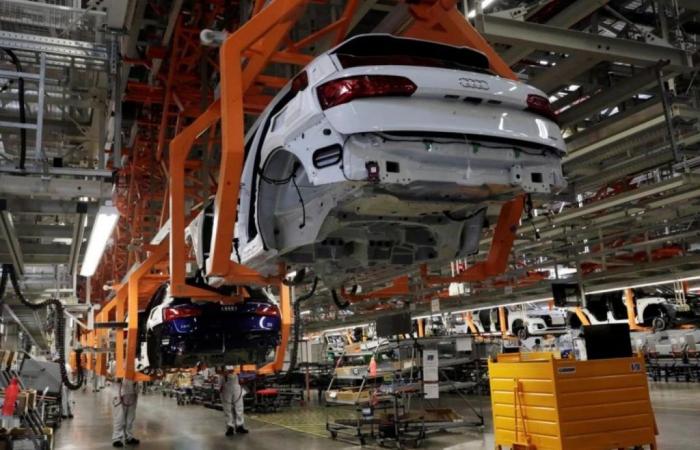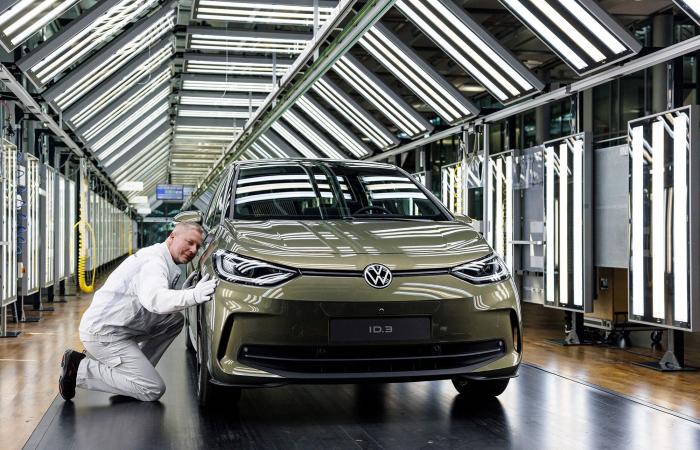Electric car news
The European automotive industry is currently going through a period of unprecedented turbulence. Between the drop in demand for electric cars and the strategic errors of manufacturers, the sector is facing major challenges which could have dramatic consequences on employment and the continent’s economy.
A changing market
The European automobile market has been undergoing profound transformation for several years. The transition to electric, initially seen as an opportunity for growth, is turning out to be a major challenge for manufacturers. The demand for electric vehicles is progressing less quickly than expected, mainly due to the reduction or elimination of purchasing aid in several countries.
This situation has a direct impact on production. According to the latest data, around a third of the largest European manufacturers are not running their factories at full capacity. Iconic brands like BMW, Mercedes, Stellantis and Renault are affected. Some sites are only operating at 50% capacity, which represents a considerable financial loss for businesses.
The causes of the crisis
Several factors explain this worrying situation:
- The decline in electric car sales due to the reduction in government aid
- THE strategic errors of certain manufacturers in their transition to electric
- The increased competition from Chinese brands on the European market
- THE aftereffects of the Covid-19 pandemic and component shortages
The example of Volkswagen is particularly revealing. The German giant is considering the closure of two factories and has even terminated a 30-year-old employment guarantee agreement, paving the way for massive layoffs.
The consequences on employment and the local economy
The automobile industry represents a pillar of the European economy. It accounts for more than 7% of jobs on the continent, or around 13 million employees. The planned factory closures would therefore have a considerable impact on employment, but also on the economy of the regions concerned.
Automotive factories are often at the heart of real local economic ecosystems. They attract employees’ families to surrounding towns and create indirect activity for businesses and services. Their closure could therefore have a disastrous domino effect on entire regions.

The most threatened sites
Among the factories most threatened, we can cite:
- The Renault factory in Douai, which assembles the Renault 5 E-Tech
- The Fiat Mirafiori site, which produces the Fiat 500 electric
- The Audi factory in Brussels, threatened by poor figures for Q8 e-tron
These sites are emblematic of the difficulties encountered by the industry. For example, sales of the electric Fiat 500 fell sharply, with only 20,700 units sold in Europe between January and July.
Manufacturers’ strategies in the face of the crisis
Faced with this situation, manufacturers are adopting different strategies. Volkswagen has abandoned plans to build a new factory in Germany and is focusing on cutting costs. Stellantis, for its part, is facing a sharp drop in profits and is also considering cost-saving measures.
Mercedes, lagging behind in the electric car segment, is struggling to regain its pre-pandemic production levels. The brand must accelerate its transition to electric while managing the drop in demand for its thermal models.
Conversely, Renault seems to be doing well. The French manufacturer recently announced recruitments, driven by good commercial performances. This exception shows that adapted strategies can still bear fruit in this difficult context.
The future of the European automotive industry
The future of the European automobile industry is uncertain. Manufacturers must meet several challenges simultaneously:
- Accelerate their transition to electric while managing the drop in demand
- Facing Chinese competition increasingly present on the European market
- Adapt their production capacities to the new market reality
- Preserving jobs and skills in a context of restructuring
These challenges require a coordinated response from industry and government. Massive investments in research and development, particularly in batteries and charging technologieswill be necessary to maintain the competitiveness of European industry.
The current crisis could also accelerate the consolidation of the sector, with mergers between manufacturers to pool development and production costs.
Finally, the question of the reconversion of industrial sites and the training of employees in new electromobility professions will be crucial to preserve employment and skills in Europe.
The European automobile industry is at a turning point in its history. The decisions taken in the coming months will be decisive for its future and that of millions of employees on the continent. One thing is certain: the European automotive landscape will be profoundly transformed at the end of this crisis.
Written by Albert Lecoq
Specialist in electric car buying guides, I am passionate about new technologies and am a strong supporter of the adoption of electric technology and sustainable mobility.
React to the article







